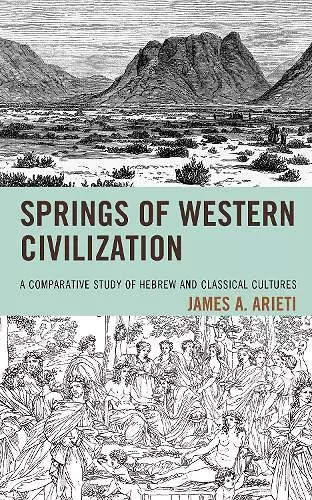Springs of Western Civilization
A Comparative Study of Hebrew and Classical Cultures
Format:Hardback
Publisher:Lexington Books
Published:14th Jul '17
Currently unavailable, and unfortunately no date known when it will be back
This hardback is available in another edition too:
- Paperback£42.00(9781498534819)

Springs of Western Civilization is a comparative exploration of the Hebraic and classical traditions that form our heritage. In examining these traditions before they united, James Arieti locates the catalyst for their bonding in two related circumstances: adoption by the biblical world of an eclectic mélange of Platonism, Aristotelianism, and Stoicism that, in the centuries on each side of the Common Era, produced consensus models both of God and of a warmhearted individual; and belief that the writings of Plato were literally true—a belief that arose from failing to understand his playful, metaphorical techniques of composition. Among the many effects of the mingling of biblical and philosophical values was a re-focusing of literature from the heroes of epic to the compassionate characters we recognize as Menschen.
A prolific and versatile scholar, Arieti (classics, Hampden-Sydney College) here focuses his analytical lens on the parallel phenomena of the classical and biblical traditions that inform the basis of Western civilization. Using a binary comparative approach, Arieti anatomizes common themes in both biblical and classical literature, adducing a panoply of value-laden paradigms of experience—among them fratricide, talking animals, rainbows—characteristic of both the classical and Hebraic cultures to illustrate some fundamental differences between the two, for example rational calculation versus precipitate intuition. Addressing the literary and cultural evidence in the period from roughly 300 BCE to 300 CE, the author underscores the consistency of each tradition in asserting its basic value system and methodology and simultaneously generating and absorbing elements from the larger context of the Hellenistic philosophical and religious environment. Thus, rabbinical exegesis and commentary clearly reflect the influence of Hellenistic philosophical modalities. Citing differences as well as similarities, Arieti posits that a confluence of these traditions resulted in the emergence of a specific worldview incorporating the emergence of what is termed Mentshlekhkeyt—reflecting a humane kindness and a “heart aglow with love" (to quote from chapter 6). Superbly documented and researched, this volume makes a significant contribution to interdisciplinary scholarship. Summing Up: Highly recommended. Upper-division undergraduates; graduate students. * CHOICE *
The author is well aware that his ideas will not find acceptance everywhere, but presents them in a manner that succeeds in being both stimulating and irenic, and should give rise to further debate. * Journal for the Study of the Old Testament *
Arieti's well-documented text is dense and challenging. . . By dwelling on the author's examples and passionately pondering his conclusions, those of us engaged in the pursuit and transmission of the humanities can help fulfill an ancient prophet's prayer that someday "justice will well up as waters/ And righteousness as a mighty stream" (Amos 5:24). * The Classical Journal *
In this masterful work, which is the product of a lifetime of extensive learning, James Alexander Arieti attempts to illuminate for his readers the differences between the ancient Greek world and the world of the Hebrew Bible (and later Jewish commentary on the biblical texts). The profoundly pluralistic society in which the West now lives has at its source the great river of culture produced when the streams of Greek and Hebrew thought and art flowed together. Arieti examines Greek and Hebrew attitudes towards all those things in which human life is enmeshed, from nature to politics, from family life to religion. And he shows not only the great differences between the Greek and Hebrew worldviews but also their diverse advantages as sources for a good human life and a just human community. The result is a deep and moving reflection on the nature of our civilization and the strengths and weaknesses of the cultures out of which it arose. -- Eleonore Stump, Saint Louis University
James Arieti in his Springs of Western Civilization has given us all a precious gift in this interdisciplinary study comparing the Hebrew Bible and classical Greek literature, the two foundations of Western civilization. With great erudition and insight and an inviting balance of breadth and depth, Arieti brilliantly analyzes parallel stories and teachings on dozens of topics in order to derive their respective philosophical and humanist worldviews. Students of the Bible and those versed in Greek culture will both experience meeting a long lost twin brother who is struggling through so many of the same existential issues and reaching conclusions often similar, sometimes at odds, but always mutually illuminating. -- Rabbi Dr. Richard Hidary, Yeshiva University
ISBN: 9781498534796
Dimensions: 238mm x 158mm x 31mm
Weight: 671g
338 pages